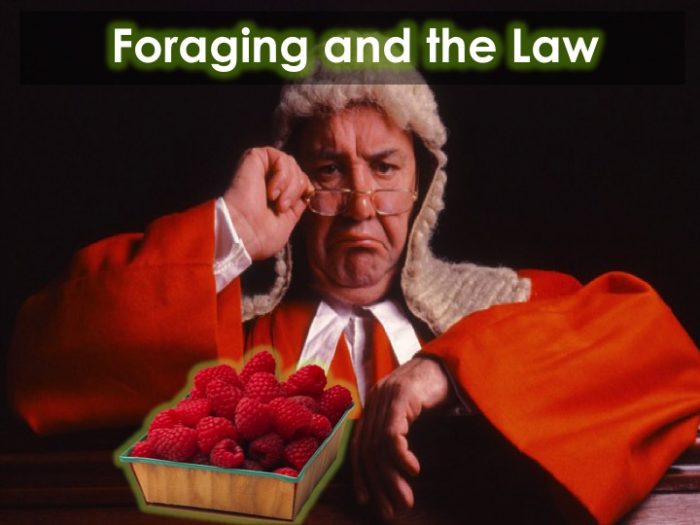Foraging and The Law
People I take out foraging often ask me what the legal position is on gathering food from the wild. Generally speaking, most foraging is fine if exercised with care, a little research and respect for other land users or owners. I have often been begged to remove “toadstools” from peoples gardens that have proven to be highly prized gourmet mushrooms! The following is my take and advice on legal rights, restrictions and responsibilities with regards foraging. I’m afraid its a bit dry, but it will hopefully tell you what you need to know…
This post deals with the legalities of foraging, but I recommend you first read my recommended principles and practice around how to be a sensible and sensitive forager. I deal with Scottish foraging law in the first instance, then English foraging law. The two are quite similar, except that in Scotland we have no trespass law.
We are fortunate in Scotland that our “right to roam” is enshrined in law. The historic tradition of universal public accessa to all land was finally codified into Scots law in the Land Reform (Scotland) Act 2003. This permits us to use all land, public or private, for recreation, education and access with only a few restrictions. This right is only protected if exercised responsibly with respect to the rights of landowners and other users.
This doesn’t mean we can stravaig about the countryside helping ourselves to all the wild food we come across. The Theft Act 1978 makes it illegal to uproot or otherwise damage any plant on private land for commercial purposes without the permission of the landowner. This presents some challenges for businesses looking to use wild ingredients. I work and consult closely with businesses to help them navigate this path responsibly, legally and sustainable. Interestingly, in Finland and other Scandinavian countries, “Everyman’s Rights” are enshrined in law, allowing anyone to forage for fruits and fungi on any land, regardless of ownership, even if they are picking for commercial gain. Not only that, but all income from wild food is exempt from income tax!
Related Posts:
- Chanterelles – Sustainable and Considerate Harvesting
- An Introduction to Fungi Foraging
- Responsible Foraging
- Foraging, Sustainability and the Media
- Foraging in the Modern World: Foraging for Money
- Fungi Knives – The Lowdown
Scotland’s enlightened approach does not apply south of the border, and England has some pretty arcane trespass laws. Essentially though, if you are legally on land in England (ie. public land, public rights of way etc), you can apply the same foraging principles I note below.
So if you are legally on some land, you can legally gather fruits, nuts, foliage, seaweeds, shellfish and seeds for personal consumption. There seems to have been some legal uncertainty as to whether mushrooms should be treated as plants (not to be uprooted) or fruits (fair game). I once had a heated debate with an irate factor over this point of law! Although I made a tactical retreat on that occasion, common sense and science seem to have prevailed. As spore bearing mechanisms mushrooms have much more in common with fruits – so you are not technically “uprooting” or damaging anything (see article on how to pick mushrooms). All scientific research points to the fact that picking mushrooms has at worst zero impact on future harvests, and may benefit fungi by spreading their spores.
The Wildlife and Countryside Act 1981 as amended by the Nature Conservation (Scotland) Act 2004 make it illegal to collect wild plants or fungi on a National Nature Reserve (NNR) or a Site of Special Scientific Interest (SSSI) without the express permission of Scottish Natural Heritage, who would first require you to present written permission from the landowner. There is also a long list of protected species which you should be aware of, though you are unlikely to encounter them without actually seeking them out – and none are recommended on this site. That is not to say that you can’t forage at all on protected areas (I work with lots of conservation organisations that actively promote foraging on their reserves), only that you should familiarise yourself with what is being protected and modify your activities if necessary.
You should also be aware that some non-native invasive species are subject to strict controls. Most notably, Japanese Knotweed and American Signal Crayfish (both excellent eating), are highly sensitive and should not be collected without first familiarising yourself with the potential ecological impact of their spread and subsequent legal controls.
If this all seems a little daunting, try not to worry too much. A sensible and sensitive approach to harvesting, conservation and other land users and owners is all you really need. The majority of the species covered on this site grow and rot away in their thousand, if not millions, of tons each year and you should feel good about saving a few for the pot when they are in season.
Happy foraging!
Related Pages:
